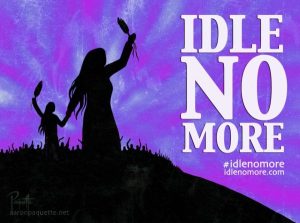I would recommend going to Alter.net and reading the full article as it also focuses on the nuclear threat that humanity faces and how we in the West have been merrily poking at the hornets nest of annihilation with a stick. The part I quoted (after the Idle No More manifesto) deals with the struggle between the so called civilized societies versus the indigenous societies that is going on in many countries.
 In Canada, our First Nations are organizing into a national movement called Idle No More. From their manifesto:
In Canada, our First Nations are organizing into a national movement called Idle No More. From their manifesto:
“We contend that: Currently, this government is trying to pass many laws so that reserve lands can also be bought and sold by big companies to get profit from resources. They are promising to share this time…Why would these promises be different from past promises? We will be left with nothing but poisoned water, land and air. This is an attempt to take away sovereignty and the inherent right to land and resources from First Nations peoples.
We contend that: There are many examples of other countries moving towards sustainability, and we must demand sustainable development as well. We believe in healthy, just, equitable and sustainable communities and have a vision and plan of how to build them. Please join us in creating this vision.”
They are pissed, and rightly so, and are demanding that we build a sustainable future in Canada as opposed to the Neo-Conservative capitalist trajectory we are currently on. Their movement is incrementally gaining traction in Canadian politics as their message, when and if it is heard, resonates with much of Canada’s populace.
INM and the indigenous people that Chomsky mentions understand that the market is not god and that the idea of a sustainable future runs counter-current to many of the practices Western societies take as the norm. The indigenous societies understand the link between the land and the people that live on it.
They get it. And we, fundamentally, do not.
The view from the business end of the colonial bludgeon provides a clarity that Western societies desperately, necessarily, need to listen to. Ignoring indigenous movements that demand sustainability over profitability such as Idle No More imperils the future for everyone.
So, at one extreme you have indigenous, tribal societies trying to stem the race to disaster. At the other extreme, the richest, most powerful societies in world history, like the United States and Canada, are racing full-speed ahead to destroy the environment as quickly as possible. Unlike Ecuador, and indigenous societies throughout the world, they want to extract every drop of hydrocarbons from the ground with all possible speed.
Both political parties, President Obama, the media, and the international press seem to be looking forward with great enthusiasm to what they call “a century of energy independence” for the United States. Energy independence is an almost meaningless concept, but put that aside. What they mean is: we’ll have a century in which to maximize the use of fossil fuels and contribute to destroying the world.
And that’s pretty much the case everywhere. Admittedly, when it comes to alternative energy development, Europe is doing something. Meanwhile, the United States, the richest and most powerful country in world history, is the only nation among perhaps 100 relevant ones that doesn’t have a national policy for restricting the use of fossil fuels, that doesn’t even have renewable energy targets. It’s not because the population doesn’t want it. Americans are pretty close to the international norm in their concern about global warming. It’s institutional structures that block change. Business interests don’t want it and they’re overwhelmingly powerful in determining policy, so you get a big gap between opinion and policy on lots of issues, including this one.
So that’s what the future historian — if there is one — would see. He might also read today’s scientific journals. Just about every one you open has a more dire prediction than the last.


3 comments
June 12, 2013 at 7:12 am
john zande
Hope this spreads to Australia and Brazil. Ridiculously, Brazil is going backwards on its energy policy. It pioneered and perfected bio-fuels (from sugar cane) which now power over 50% of all cars. Here’s the stupid part: sine discovering they’re sitting on a shit load of oil the government has been encouraging consumers to switch back to petrol to help pay for its exploitation.
The stupid truly does burn strong. .
LikeLike
June 12, 2013 at 8:25 am
The Arbourist
That blows my mind. Hey, lets switch back to non-renewable resources so the right people can make a buck. Actually, that sounds just about right for the current mind set of our elites.
*sigh*
Unenlightened self-interest is grand, isn’t it? :/
LikeLike
June 17, 2013 at 1:11 am
Another Week of Global Warming News, June 16, 2013 – A Few Things Ill Considered
[…] 2013/06/12: DWR: Noam Chomsky on Destroying the World […]
LikeLike